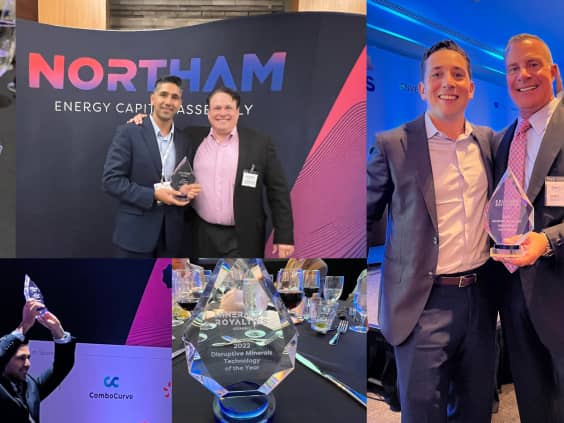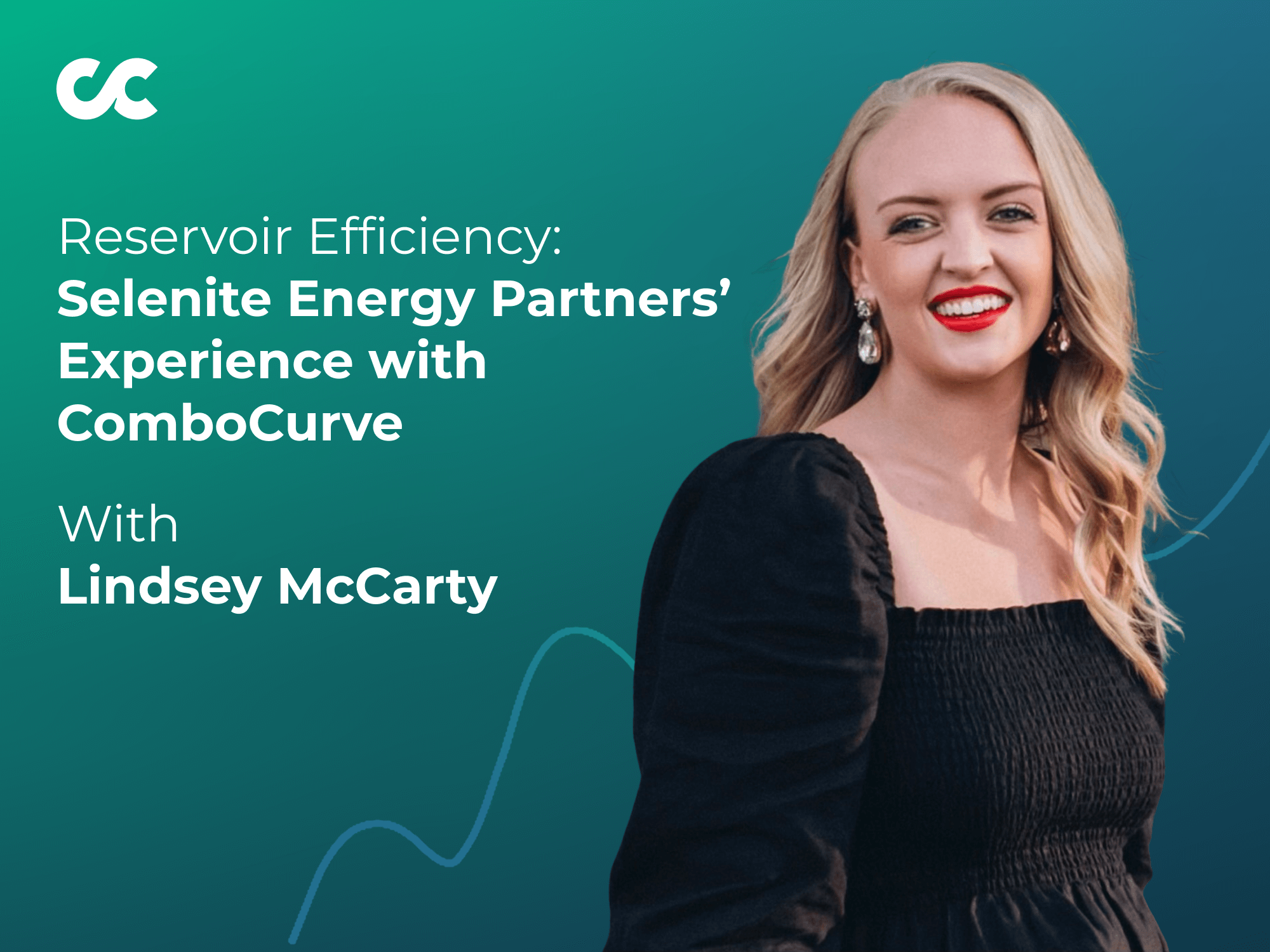A Tale of Two Interns: ComboCurve Style
Since its establishment in 2020, ComboCurve has been committed to recruiting top college talent, offering growth opportunities, and involvement in impactful projects in Oil & Gas through ComboUniversity. ComboUniversity is an outreach program that brings ComboCurve to petroleum engineering students at Universities around the globe.
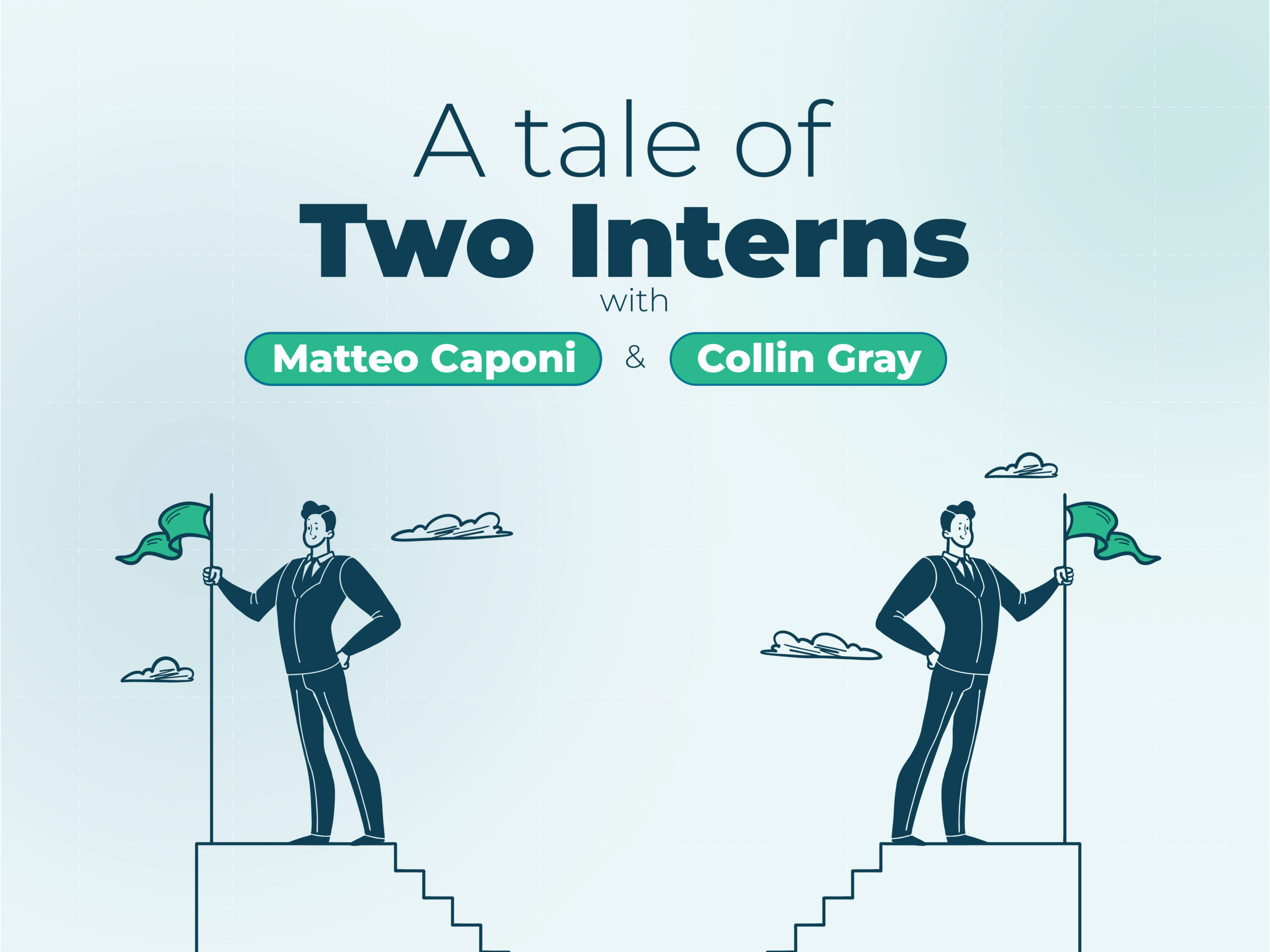
Embarking on an internship journey can be both exciting and overwhelming. It sparks questions like: What is it like to intern at ComboCurve? How can you land an internship with us? And perhaps most importantly, what career prospects does this lead to for your professional future?
Transitioning from College to Career
Our Marketing Manager, Alexandra Brasher, recently sat down with Collin Gray and Matteo Caponi, former ComboCurve interns turned full-time employees. In a candid discussion, they share their individual internship experiences. They offer valuable insights into how they secured their internships, their roles and expectations, and the swift transition into full-time positions at ComboCurve only a few months after earning their degrees. Collin now serves as a Support Engineer – Team Lead, overseeing a team of CSEs and CS professionals. Among his team members, Matteo specializes in handling tickets.
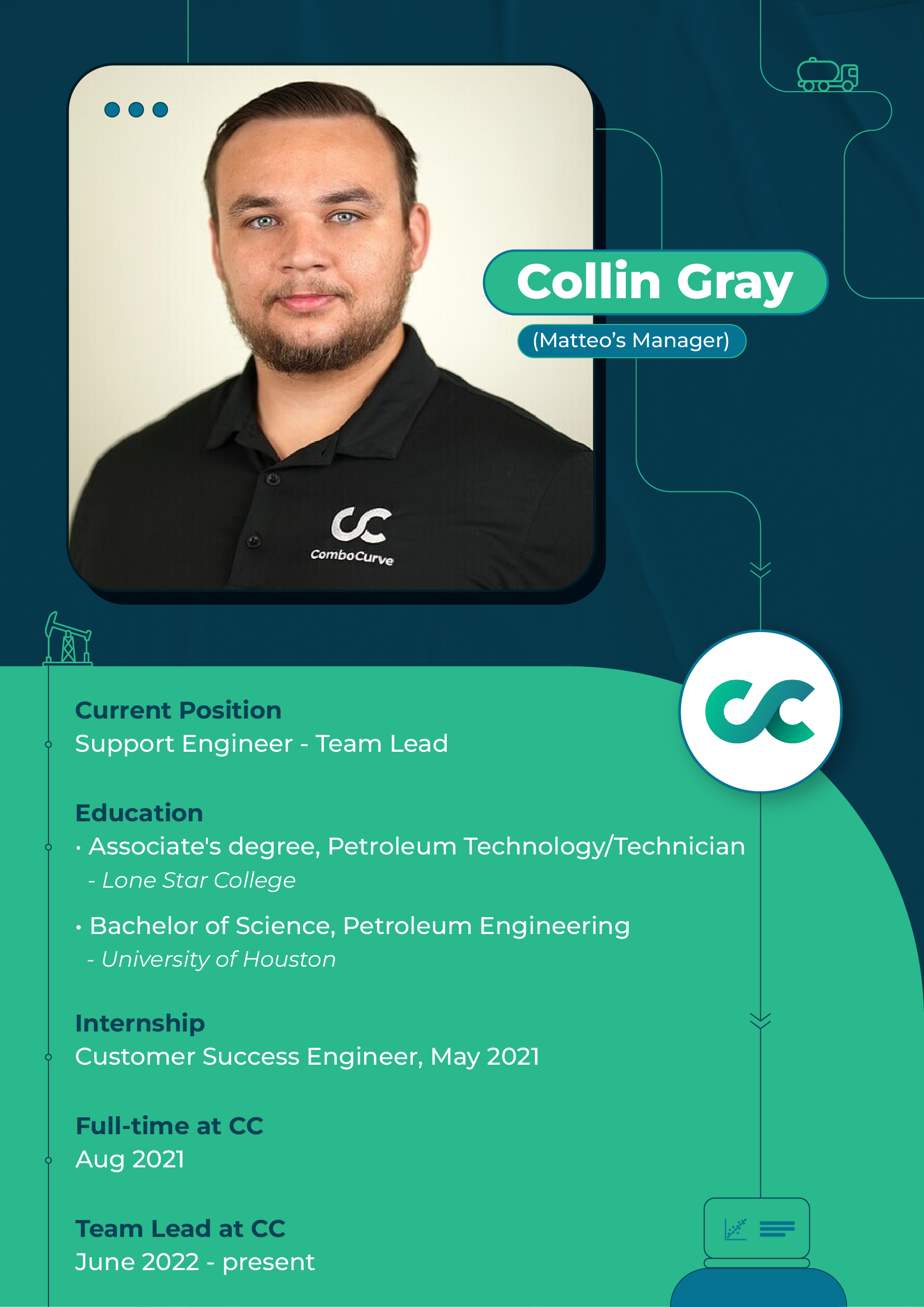
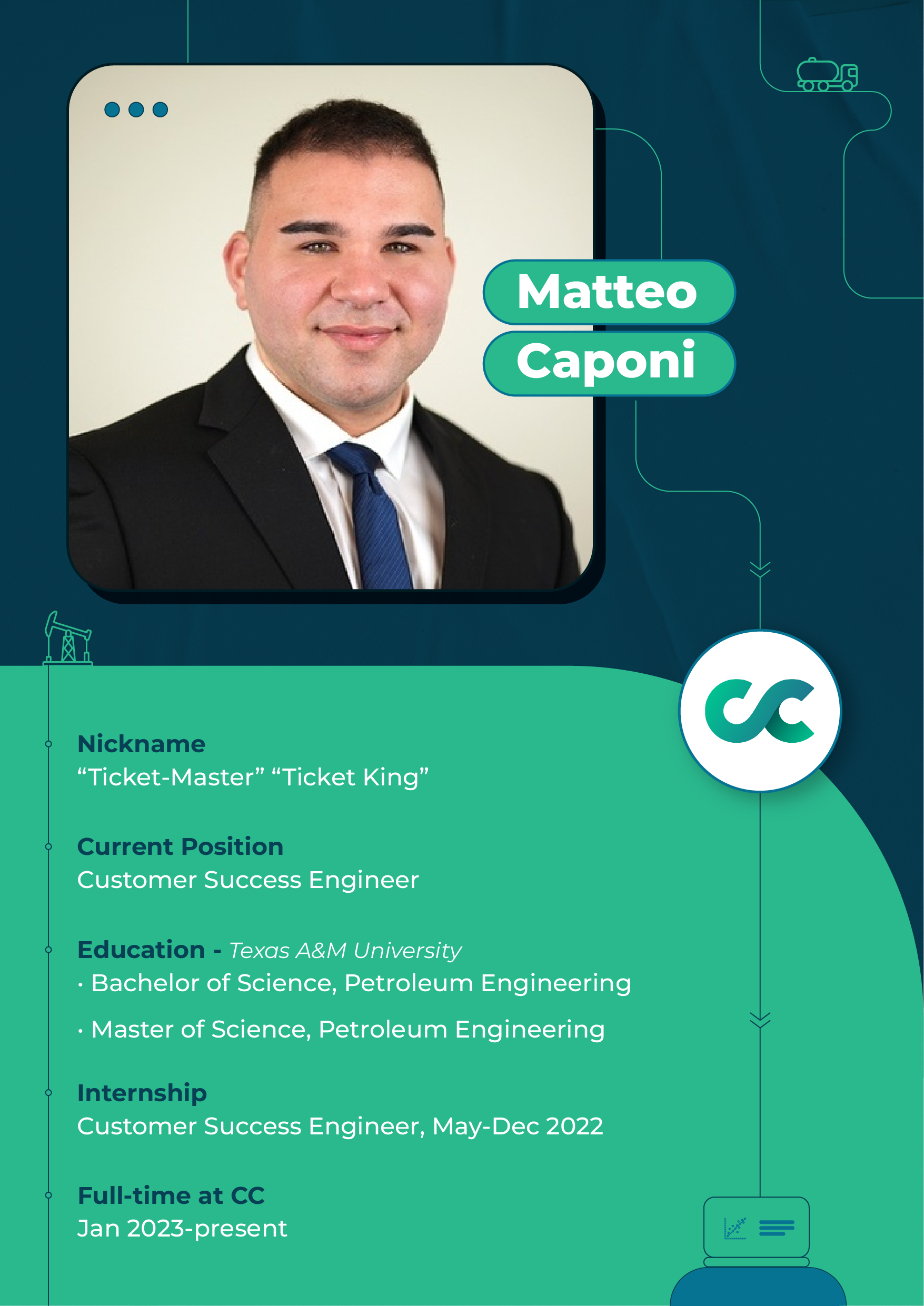
Matteo, Collin, and the Path to ComboCurve
Both Matteo and Collin have taken somewhat unconventional routes to get to the Oil and Gas industry and, subsequently, to ComboCurve as interns.
Hailing from Orentano, a picturesque town in the Tuscan countryside of Italy, Matteo’s journey took an international turn when he moved to the United States at the age of 20.
Matteo Caponi: I wasn’t really sure what to do – I knew I wanted to do something engineering-related, but I wasn’t sure if I wanted to do chemical, petroleum, or something related. I decided to look for a career in the Oil and Gas Industry. So, I enrolled at Texas A&M, earning my undergraduate degree in Petroleum, and later pursued a master’s degree in Petroleum as well.
During his final year as a graduate student, Matteo joined ComboCurve as a summer intern in 2022. Subsequently, he continued to contribute part-time during the fall and made the transition to a full-time position at ComboCurve in January of the following year.
In contrast, Collin, who grew up in the US, initially had no intention of pursuing a university education and instead opted to establish a more hands-on career in the field.
Collin Gray: I was not interested at first in attending college as I was unsure about the return on investment at the time.. I wanted to get straight into Oil and Gas and work on rigs wherever I could.
So what steered Collin towards post-secondary education? After graduating high school in 2015, [CG: (sarcasm) an incredible year for Oil & Gas!] Collin made an unexpected detour and decided to attend Lonestar Community College. Here, he pursued two 2-year associate’s degrees. Following this, he transferred to the University of Houston to pursue his undergraduate degree in Petroleum Engineering.
Upon graduation, Collin ventured into the field, gaining practical experience, including a stint in New Mexico where he worked on drilling a couple of wells. Interestingly, these wells happened to belong to some of ComboCurve’s existing clients.
CG: I think everyone should go to the field once, and understand the operations, what’s going on, and what’s happening. However, it’s quite common to hear questions like, “Why are you choosing to be here? You’re an engineer.” People often wonder why someone with extensive education would opt for fieldwork. The real eye-opener for me was when I recognized the possibility of building a lifelong engineering career while working remotely from home. That was a mindset shift that, all through college, I didn’t know was possible. Obviously, the pandemic had something to do with that.
ComboCurve’s Co-founder, Jeremy Gottlieb, discovered Collin through one of the University of Houston’s student societies, Pi Epsilon Tau.
In the fall of 2021, he received an offer. About 6-7 months later, he was entrusted with a managerial role as Team-Lead for support engineers.
The Intern days: Mentorship, projects, and solving challenges.
Matteo’s internship at ComboCurve marked his first experience with a US company. He was fortunate to be mentored by a former ComboCurve Customer Success Team Lead, as well as his predecessor Ibsen Esqueda.
MC: Ibsen was very knowledgeable on everything about the O&G reservoir engineering side, and I got the opportunity to learn from him. He guided me through learning the software step-by-step while I simultaneously learned the practical, hands-on O&G industry side they don’t really teach you at school. That really set me up for success. Also, Collin had helped me a lot, from the ticketing side, going through the demo tickets, and I was able to learn how to best help clients.
During his internship, Matteo learned many of the skills that would help him be successful as a full-time employee.
MC: One thing I made sure to do in the internship was stay on top of ticket responses. I was trying to learn as much as I could and in order to do that, I had to be on as many tickets as possible. Over time, I was certified to answer tickets.
AB: I’ve specifically heard you’re known as the “ticket monster” or the “ticket king,” diligently addressing inquiries at all hours, even at all hours during the night!
Collin, on the other hand, worked on an intern project that required him to model ComboCurve’s forecasting calculator in Excel – a pretty significant undertaking. Essentially, he had to replicate all the forecasting calculations conducted within ComboCurve in spreadsheets.
CG: The forecasting calculations are very simple. These are calculations Matteo and I learned in engineering school. They’re called “ARPs models” (named after the person who invented them), and it’s just a decline curve calculation. Now the hard part would be, how does ComboCurve optimize that calculation to find the exact parameters? That’s the secret sauce in ComboCurve – that’s something I didn’t replicate in Excel, I simply made the calculator that gives you the equation if you input specific data points.
Collin’s onboarding at ComboCurve was overseen by Hunter Yeagle, who had previously held positions in Business Development and Product Development at the company.
CG: He [Hunter] and Jeremy really set the precedent for the kind of customer support we provide at ComboCurve. Regardless of the circumstances, we gotta make sure these folks [clients] are taken care of.
However, a sad turn of events occurred in 2021 when Hunter Yeagle passed away. In the absence of someone to manage ticketing, Collin assumed this responsibility. Eventually, additional support was brought in to assist.
Collin’s hands-on experiences enabled him to hit the ground running, giving him an advantage in gaining a deeper understanding of the company, the rapidly evolving nature of his role, and the individuals he would soon be working with closely. In fact, he shares an amusing anecdote about one of his early experiences at ComboCurve.
CG: It’s kind of a funny story. At the time, I had to present this project to Armand [Paradis] and Jeremy – each of whom had different preferences for presentations. Armand is more technical and Jeremy prefers a more direct delivery of information. So, I made two presentations and presented them to them independently of one another. Jeremy got a nice, clean PowerPoint and Armand got Excel and Word documents, with full paragraphs of everything detailed and it worked out because they both were like “Collin, this is great!”
What does the day-to-day of a ComboCurve employee look like?
During Collin’s internship, his primary responsibility was handling tickets, and he was the sole person managing this at the time. Eventually, two more CSEs, Chase Gay, and Brodee Lee, were hired, trained, and shared the workload.
CG: When I was hired, I was the first person who wasn’t a salesperson. I had a few clients. Obviously transitioning to a full-time role, the scope grows and I’m no longer just doing tickets. As a manager, I now meet with Product.
To enhance the collaboration between the Customer Success team and the product managers, ComboCurve introduced a new position called Product Liaison. Collin serves as the liaison for the General app and conducts monthly meetings with Scott Hamilton, Energy Platform Product Manager.
CG: We discuss all the features he’s building out and anything he has coming up, give him priority to all the features he has, and determine what would create the biggest value-add for our current clients. The scope grew from managing tickets to the knowledgebase, and recently, we launched an innovative initiative, like activating the community.
“Combo Community” is a forum environment where ComboCurve’s existing clients can connect with other users, share best practices, exchange industry insights, and even earn badges through gamification. By consolidating our ticketing system, community forums, and knowledge base into a unified platform, ComboCurve users can access and search for any information they need in one place.
CG: It’s about getting as much information to the clients. The scope of support has really grown over the last 18 months, extending to things like customer success, university outreach, managing certifications, data maintenance, and work distribution, to name a few.
As ComboCurve continues to grow and evolve rapidly, employees have the potential to progress from entry-level roles to mid-senior positions quickly. Collin emphasizes the importance of adaptability and being prepared for the dynamic nature of the company, a sentiment shared by Matteo in his experience.
MC: My day-to-day falls into something of a gray area… Technically I’m a CSE, but I spend maybe 5% of my time doing CS work. 95% of my time is spent on support, which is answering tickets. Additionally, I used to be part of triaging, where we would triage any bugs that were live on production and I would report the bugs, providing the product and developer teams with additional information so they could assess how critical the situation was, and work to resolve it. I don’t do much of the triaging anymore but I still try to do a lot of the reporting, since most of the bugs are identified through tickets anyways.
When it comes to my schedule, we do have a system that assigns us some evenings and weekends so that we aren’t working all day long. Typically, I work from 8 a.m. to 5 p.m., and I’m on-call one evening per week, usually until midnight.
How to Maximize Your Internship Experience at ComboCurve
Both Collin and Matteo offer valuable, actionable advice for prospective interns, particularly within a startup environment, emphasizing the importance of effective communication, adaptability, continuous learning, and proactive engagement.
Collin Gray:
On Remote Work: Unlike in the past when we relied on emails, today’s communication needs to be lightning-fast and crystal clear because I can’t just walk over to your office for a chat. Being highly responsive with your communication makes remote work efficient and successful.
On Flexibility and Learning: Flexibility is crucial, especially in a startup. You’ll have the chance to take on various roles. Look at Matteo, whose primary role is CSE, but he’s also our “ticket master” handling CS work. Be open to learning and contributing wherever you can add value.
Matteo Caponi:
On Growth and Recognition: From my experience, I’ve never felt unsupported here. And I feel that because of all the support and knowledge I received from the team members, I really feel that if you work hard, you will be recognized and rewarded for your efforts. And that will make your experience a lot better.
On Being Proactive and Asking for Guidance:
Because it’s a very flexible workspace, you have room to communicate about what type of work you would prefer to focus on. And the management will try to have you do that instead of something you prefer not to do. And if you don’t know something, ask. I always tried to get everybody’s help when I didn’t know something. That way I could challenge myself to answer the clients and be able to figure it out. And when I didn’t know how to do it, I would always ask for help from either Collin or Ibsen, helping them out and learning from them at the same time.
Alexandra Brasher: I agree. I really feel like ComboCurve is a place where growth and responsibilities are yours for the taking. If you want to grow and take ownership, this is the place – regardless of your starting point. This is a place where you can be a manager in 1 or 2 years. It’s about how hungry you are not about your accolades, which is really great.
There you have it. Whether you’re passionate about Oil and Gas or Oil and Gas Technology, or if you’re eager to join a rapidly evolving remote company, ComboCurve offers a unique opportunity to jumpstart your career even before you graduate. We’re offering multiple ways to be involved with the ComboCurve Community, through internships, certifications, and through ComboUniversity.
See how your team can go from forecast to economics in minutes with energy’s fastest analysis engine.
Related Posts
January 17, 2023
ComboCurve Disrupts Energy Industry Awards Season
"We have an incredibly skilled team of passionate people solving important problems. ComboCurve is thrilled to be recognized as a leader in energy expansion."
August 7, 2023
Reservoir Efficiency: Selenite Energy Partners’ Experience with ComboCurve
As the Chief Operating Officer of Selenite Energy Partners, a structured capital finance company, Lindsey McCarty has been navigating the nuances of oil and gas for over 15 years.
October 3, 2023
Commit to ComboCurve for Reserves
Luke Cone joined ComboCurve a few years ago to contribute to streamlining reservoir engineering processes. His subsequent move to Grit Oil & Gas saw him advocating for ComboCurve's integrated solutions, specifically in using ComboCurve for reserves.
